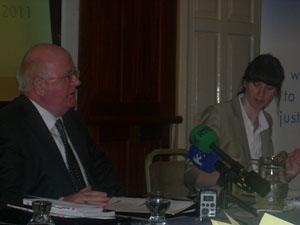SJI budget aims to correct inequalities

An alternative budget for 2011, launched on Monday by Social Justice Ireland (SJI), tackles the contentious issues of pensions, third level fees and corporation tax in search of a fair budget. Details of Budget 2011 will be announced on 7 December by Finance Minister Brian Lenihan. By Alison Spillane.
SJI director Fr Seán Healy said that the government "savaged" poor people in the last three budgets and left the rich untouched. In Monday's policy briefing, entitled 'A Fairer Future is Possible', SJI proposed measures to correct this imbalance in areas such as taxation, education, and social welfare.
SJI says that the current minimum wage (€8.65 per hour) should be protected. It says that any cut in this area would be of little benefit to the State. "Indeed the cost of exposing more workers to poverty and greater inequality," it says, "while deepening the experience of others in poverty would far outweigh any possible gains."
The organisation proposes a tax of 0.33 cent on every text message sent via SMS; such a measure would earn the exchequer €25 million. SJI also suggests an increase in the tax-take from gambling, providing €40 million.
Introducing a system of refundable tax credits to help the working poor would cost the State an estimated €140 million, while if the SJI's proposal to standard rate all pension contributions was adopted it would result in income of €1.4 billion.
The organisation acknowledges that the introduction of a universal pension would require "a shift from entitlement based on labour force participation to entitlement based on citizenship". However, it argues that such a move would not result in significant cost increases if the cost to the State of tax expenditure on the private pension system was taken into account.
SJI's alternative budget calls for a levy of 2.5% on all profits from the corporate sector and the suggested reintroduction of third level fees, two issues that have caused controversy in recent months.
The issue of corporation tax has caused some discomfort for the government over the past week as work began with EU authorities on a four-year austerity plan to improve the state of the country's finances.
EU economics commissioner Olli Rehn commented that Ireland "will not continue as a low-tax country" and that no area of taxation should be considered exempt from increases. Despite these statements, the government has ruled out any increase in the 12.5% corporation tax.
The American Chamber of Commerce added its voice to the din saying no measure which would negatively affect multinational investment in Ireland could be considered in Budget 2011. However, yesterday Seán Healy argued that there is no evidence to support the assertion that multinationals would leave the country if the corporation tax was increased.
With regard to college fees, SJI estimates that the introduction of a loan scheme for third level students would earn the State €445 million. Former Minister for Education Batt O'Keeffe raised this issue in 2008 but met strong resistance from the Union of Students in Ireland (USI).
In Febuary 2009, around 15,000 third level students took to the streets of Dublin in protest against the threatened reintroduction of tuition fees. Were the motion proposed again, the government will likely meet similar objections from the USI.
However, studies have shown that the abolition of third level fees in 1996 has not been successful in creating equality within the Irish education system. In a paper on the effect of abolishing university fees, Prof Kevin Denny of UCD observed, "For young people from a low SES (socio-economic gradient) background in Ireland who wish to progress to university the dice are firmly loaded against them."
SJI believes the introduction of an income-contingent loan system would serve to level the playing field in terms of educational inequality as the repayment system would be based on participants' own future income rather than on current parental income.
